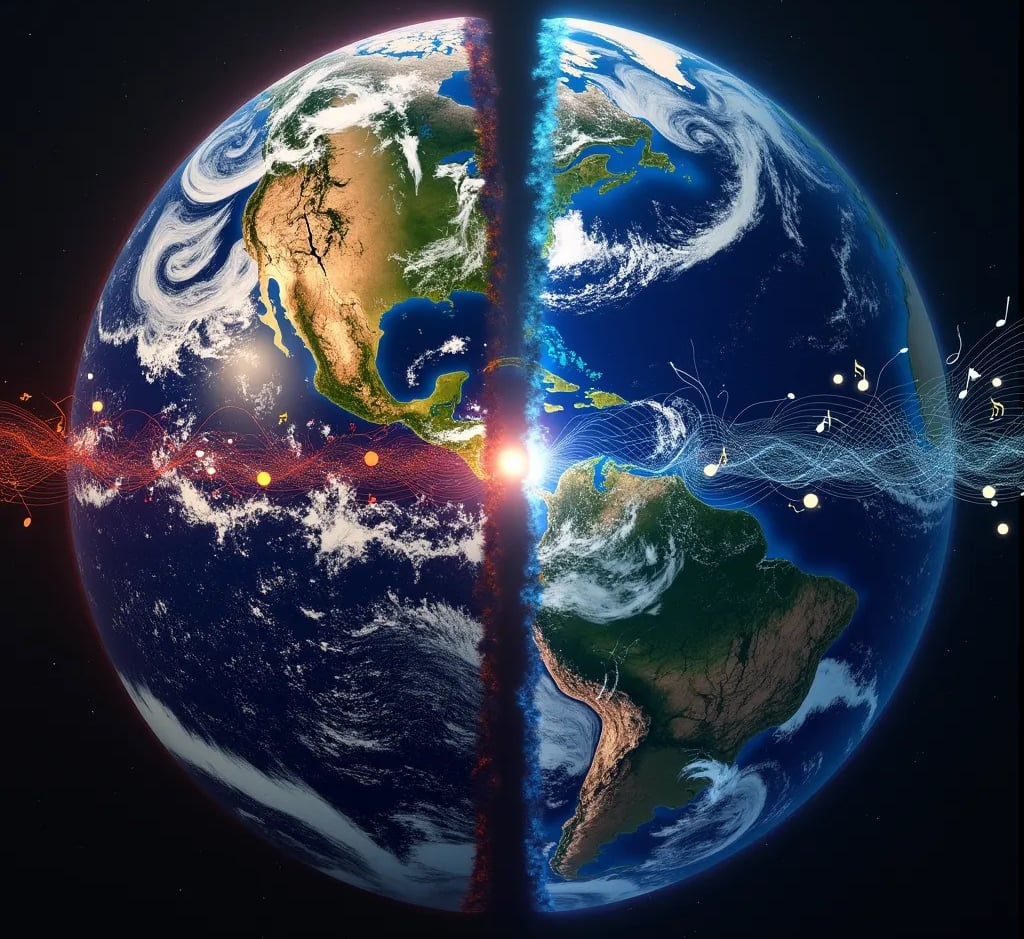Beyond Us vs. Them ~ Finding Harmony in a Divided World
Observing the escalating polarisation globally, from the UK's streets to the US political arenas and numerous conflict zones, I'm struck by how our unique 'holographic bubble' shapes our perception of reality. Our personal experiences, beliefs, and the information we consume create these bubbles, and as Plato noted, "When the mind is thinking it is talking to itself." This internal dialogue often simplifies complex global issues. However, Plato's insight that "Music is a moral law" offers guidance. Like music creating harmony from diverse notes, we can harmonise our seemingly discordant perspectives.
SPIRITUAL AWARENESS
Nigel John Farmer
8/6/20247 min read


Recent months have witnessed growing tensions worldwide. The Israel-Gaza conflict, with its tragic humanitarian crisis, exemplifies the devastating consequences of failed dialogue. Simultaneously, the war in Ukraine continues to exact a terrible toll, highlighting the brutal disregard for human life that typifies such conflicts. These wars, with their complex historical roots, exemplify the dangers of binary thinking and the urgent need for a more sophisticated approach to global challenges.
In the UK, pro- and anti-immigrant factions clash, while in the US, the presidential race has entrenched a divisive binary. Rising tensions across the Asia-Pacific region exacerbate the sense of a world on the brink of wider conflict. When influential figures, like Elon Musk, make provocative statements such as "Civil War is inevitable in the UK," I can't help but question their intentions. Such comments seem counterproductive and only serve to fuel fear-based narratives that appeal to our primitive instincts.
Mainstream media and social media platforms often resort to these narratives, targeting our basal ganglia or reptilian brain. This manipulation results in a distorted view of reality, undermines critical thinking, erodes empathy, and fosters polarised opinions. Recognising these pitfalls and striking a balance between instinctive reactions and intellectual capacities is crucial in the digital age.
Public discourse, facilitated by smartphones and social media, can trigger primitive instincts, leading to distorted perceptions of reality. Sensationalist and biased content often bypasses higher cognitive functions, exacerbating conflicts through binary 'us vs. them' narratives. Media outlets frequently prioritise sensationalism over balanced reporting, amplifying fear and division to drive engagement and profit. This approach undermines our collective ability to address global challenges effectively and diverts attention from broader issues of inequality and unsustainability.
Binary thinking enables an elite few to maintain financial and corporate domination, hindering constructive dialogue and global cooperation. However, I believe we can transcend these primitive responses by embracing a more evolved, multifaceted approach to understanding our world.
Plato's philosophical insights offer valuable guidance here. He posited that "Human behaviour flows from three main sources: desire, emotion and knowledge." This tripartite view reminds us that while our emotional and instinctual responses are part of our nature, they need not dominate our actions. By engaging our capacity for knowledge and rational thought, we can temper these more primitive impulses.
Moreover, Plato's assertion that "Wise men talk because they have something to say; fools, because they have to say something" seems particularly relevant in our age of constant communication and global connectivity. It calls for a more measured, thoughtful approach to public discourse, especially on sensitive issues like the Israel-Gaza conflict, the Ukraine-Russia war, immigration, national security, and international relations. We need to create spaces for deeper, more considered dialogue that engages our higher cognitive functions and encourages empathy and understanding.
As I reflect on these issues, I'm reminded of Plato's intriguing statement that "Music is a moral law." This metaphor offers a beautiful vision of global harmony - not a monotonous uniformity, but a rich tapestry of diverse voices coming together in concert. Just as different instruments in an orchestra or a choir of voices create a harmonious whole, perhaps we can find ways to celebrate our differences while working towards a common good for all of humanity.
It's crucial to recognise that the human species can survive and prosper on planet Earth if we all give and take with compromise. The shallow, war-like thinking that dominates current discourse - focused on protecting narrow conceptions of national identity at the expense of human lives and global stability - is not only morally bankrupt but also pragmatically unsustainable. It represents a failure to evolve beyond our most primitive instincts.
In practical terms, I believe we can work towards transcending these primitive responses and fostering global harmony by:
1. Promoting media literacy and critical thinking skills to help people recognise and resist appeals to their reptilian brain instincts.
2. Creating international forums for thoughtful, sophisticated discussions on complex global issues, emphasising our shared humanity and common challenges.
3. Encouraging self-reflection and awareness of our own biases and internal dialogues, particularly regarding our views on other nations and cultures.
4. Using arts and culture as a means of fostering empathy and understanding across national and cultural divides.
5. Holding social media platforms and traditional media accountable for their role in shaping public discourse and potentially exacerbating conflicts.
6. Supporting community-building initiatives that bring people together across perceived divides, both locally and internationally.
7. Advocating for policies that address global inequality and promote sustainable practices, recognising that many conflicts are rooted in economic disparities and resource scarcity.
8. Encouraging political leaders and influential figures to adopt more sophisticated, cooperative approaches to communication and problem-solving, moving away from inflammatory rhetoric and simplistic solutions.
9. Prioritising diplomatic efforts and international cooperation in resolving conflicts, with a particular focus on long-standing issues like the Israel-Palestine situation and the Ukraine-Russia war.
As we consider these steps towards global harmony, it's crucial to reflect on the existing frameworks for international cooperation, particularly the United Nations. The UN was founded on noble principles of maintaining international peace and security, developing friendly relations among nations, and promoting social progress, better living standards, and human rights. However, recent events have starkly illustrated the gap between these ideals and the reality of international relations.
Russia's use of its veto power in the Security Council, particularly in relation to the Ukraine conflict, demonstrates how the UN's structure can be manipulated to protect national interests at the expense of global peace and security. This abuse of power undermines the very foundations of the UN and its ability to respond effectively to international crises.
Similarly, Israel's rejection of accusations of genocide against Palestinian civilians reveals the challenges in holding nations accountable for their actions, especially when they have powerful allies. The situation in Gaza has exposed the limitations of international law and the UN's ability to protect civilian populations in conflict zones.
These instances reveal a fundamental flaw in our current global governance system: the prioritisation of national interests over collective human welfare. It's a stark reminder that our international institutions, despite their lofty goals, are still subject to the same binary, tribalistic thinking that plagues individual human cognition.
In light of these challenges, and in the context of transcending our binary thinking, I believe we must collectively work towards a new framework for a better world - one that serves both our current needs and those of future generations. This framework should include:
1. Reforming international institutions like the UN to make them more representative and effective, ensuring they can truly uphold the principles upon which they were founded.
2. Developing new mechanisms for enforcing international law that are less susceptible to manipulation by powerful states, thereby reducing the gap between ideals and actions on the global stage.
3. Fostering a global culture that prioritises human rights and collective welfare over narrow national interests, moving beyond the tribalistic thinking that often dominates international relations.
4. Encouraging more sophisticated, multi-faceted approaches to conflict resolution that go beyond simplistic for-or-against positions, recognising the complexity of global issues.
5. Promoting education and media literacy to help people understand the intricacies of global challenges and resist propaganda and oversimplification, thus enabling more informed and thoughtful civic participation.
These steps, combined with our earlier suggestions for fostering global harmony, form a comprehensive approach to evolving our collective consciousness. They underscore the need for a fundamental shift in how we approach global challenges - moving from a paradigm of competition and self-interest to one of cooperation and shared responsibility.
The gap between the UN's principles and the actions of its member states serves as a stark reminder of how far we still have to go. However, it also presents an opportunity for growth and transformation. By acknowledging this disconnect and actively working to bridge it, we can begin to create a world that truly reflects our highest aspirations for global cooperation and human dignity.
As we navigate our individual and collective binary holograms, it's crucial to remember that every polarity contains the seed of its opposite. The current global polarisation we're experiencing, while challenging, also presents an opportunity for growth and deeper understanding. By rejecting the simplistic narratives that appeal to our reptilian brain and instead engaging our higher cognitive functions, we can work towards solutions that benefit all of humanity.
In the end, addressing our global challenges requires more than just reacting to immediate events or surface-level conflicts. It calls for a deeper examination of our fundamental values, beliefs, and societal structures. By embracing a more evolved approach - one that values wisdom, thoughtful communication, and a holistic understanding of human nature - we may find a path towards a more harmonious and just global society.
As we move forward, let us strive to be those who have something meaningful to say, who engage with the full spectrum of human experience - desire, emotion, and knowledge - while also transcending our most primitive instincts. Only by evolving our collective consciousness, embracing compromise, mutual understanding, and a commitment to our shared future can we hope to overcome the challenges that face us and create a world where all can thrive. The ongoing tragedies in Gaza, Israel, and Ukraine serve as poignant reminders of the urgent need for this evolution in our thinking and actions.
I hope you find this stimulating and/or insightful ~ Nigel John Farmer
Citations:
1. Plato's quotes and philosophy: Cooper, J.M. (ed.) (1997). Plato: Complete Works. Hackett Publishing Company.
2. Israel-Gaza conflict: United Nations Office for the Coordination of Humanitarian Affairs. (2024). Gaza Strip: Hostilities. https://www.ochaopt.org/content/gaza-strip-hostilities
3. Ukraine-Russia war: Council on Foreign Relations. (2024). Conflict in Ukraine. https://www.cfr.org/global-conflict-tracker/conflict/conflict-ukraine
4. Elon Musk's comment on UK unrest: was accessed via Elon Musk's Twitter account (https://twitter.com/elonmusk)
5. Reptilian brain concept: MacLean, P.D. (1990). The Triune Brain in Evolution: Role in Paleocerebral Functions. Springer.
6. United Nations principles and structure: United Nations. (n.d.). About Us. https://www.un.org/en/about-us
7. International Court of Justice case against Israel: International Court of Justice. (2024). Application of the Convention on the Prevention and Punishment of the Crime of Genocide in the Gaza Strip (South Africa v. Israel). https://www.icj-cij.org/en/case/192

© 2023~2024~2025~2026 MeditatingAstronaut.com - All Rights Reserved Worldwide
website by Meditating Astronaut Publishing
